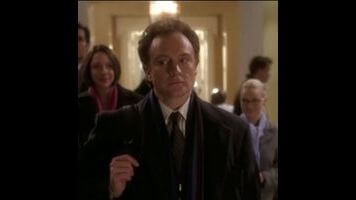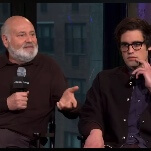“Posse Comitatus (season 3, episode 22; originally aired May 22, 2002)
Bartlet heads to New York to see a play.
I knew it was coming, and it broke my heart all the same.
Here’s something I had to look up: “Posse Comitatus,” the third season finale of The West Wing, is named for a United States act passed in 1878. Essentially, it prohibits those involved with large-scale government protection—the army, the marines, and the like—from interfering with matters of local law enforcement. So the commander of a seafaring military vessel can’t, for example, interfere in the robbery of a bodega. Neither, can I imagine, could a member of the Secret Service. At least not legally. Nor can a member of the Secret Service start a relationship with someone he’s supposed to protect. That’s not Posse Comitatus; that’s just a fact.
But say the mysterious threat had been eliminated. Say the Secret Service was no longer necessary in a situation involving a crazy stalker and a highly ranked member of the United States government. Well, said Secret Service agent would no longer be required to protect his target, and if that target was a tall gorgeous woman who looks great in a black Vera Wang (as we established last week—not a racial thing), all the better. Hey, he might even want to buy her some flowers, too.
Posse Comitatus was originally passed because the North’s military was lingering in the South after the Civil War, wreaking havoc. The act is about preventing needless meddling, and though not every part of the West Wing episode “Posse Comitatus” deals with the specifics of that particular law, the episode is about sticking your neck out where it might not belong. Aaron Sorkin presents each scenario, lays out the options, and though the characters are troubled, they know, deep down, that the right thing to do is get involved.
When the American political system was established, it seemed like there would be a series of choices at its core—actually, the most binary choice of all: Vote yes or no. We all know that given today’s political climate, it’s not nearly that simple. Votes are counted before they’re cast; personal relationships are tugged, and the fate of bills and amendments are determined long before they’re even presented. Of course, the depressing state of Democracy is the center of a lot of West Wing tension. Just look at the feud between Josh and Amy. Both are working tirelessly to ensure their ducks are in a row, and whoever does the best preparation wins the day. They’ve already cast their vote so to speak, and now they’re both compelled forward by forces unknown, diving deeper into the abyss of phone calls and secret meetings. They’ll never let the chips fall as they may; they decided long ago to build the wind machine that blows the chips over to their side. (We’re talking about literal poker chips here, right?)
The point is, we don’t see characters on The West Wing make decisions. They know what the right thing to do is already. We witness their struggles to trust themselves, knowing that occasionally it’s a self-destructive tendency. They deal with the ramifications of being themselves.
So law or no law, Posse Comitatus or no Posse Comitatus, Agent Donovan was going to step into that bodega, see it was being robbed, and intervene. As soon as he stepped in, I knew what was going to happen. But again, it was heartbreaking.
There’s a scene early in “Posse Comitatuts” where Donovan comes to the White House with Anthony, his “little brother” in the mentorship sense. We see Donovan totally relaxed, both in wardrobe and demeanor, and learn that he loves doing nice things for his mother for no reason other than, you know, why not? (At this point, Sorkin’s simply twisting the knife we all know is coming.) Anthony worries about Donovan’s safety in New York—the President is heading to the Windy Apple to take in a five-and-a-half hour-long play, with CJ and the team in tow. Donovan assures Anthony that he can handle himself in a fight. But that’s not what Anthony is worried about. “You’re slow-witted,” he says. “You’re not very bright, and the criminals can sense that about you.”
It sounds kind of harsh when it first comes out, but now, reflecting back on “Posse Comitatus,” it’s eerily prophetic. Not to say that Donovan is dumb, but he’s definitely headstrong, and easily distracted. After all, he missed the fact that CJ’s stalker was at the same mall as he was. He was too busy talking to CJ’s niece, and admiring the black Vera Wang (not a racial thing) to notice. He’s a highly trained Secret Service agent with an enormous blind spot. And that same blind spot caused him to miss the second shooter at the bodega; high off his arrest of the first guy, he had it in his mind that this night could not possibly get any better.
It’s just tragic. Because CJ was so happy! That first press briefing that opens the episode… my God, she was high as a kite off love fumes (which is the name of my new 14-person improv group). CJ could not have been more happy spoon-feeding the media bullshit about how she didn’t know Bartlet and Ritchie were going to see each other at that epically long Shakespeare play. The mood in the briefing room was electric, and for the rest of the day, CJ is in full-on flirtation mode. She lies to Donovan about her kiss, then later says she was lying! In CJ terms, that’s like full-on making out. Donovan just had to stick his neck out where it technically and legally didn’t belong, didn’t he? Yeah, I guess he did, because he’s just that good a guy.
So let’s talk about Posse Comitatus, good guys, and how it relates to Bartlet. In the last episode, it was decided that Abdul Shareef, a known terrorist, would be invited to the White House, where it would be determined whether or not to have him assassinated. Because of the Posse Comitatus law, the military can’t get involved with the plot—at least not publicly. I’m not quite sure how this falls under local or state jurisdiction, but that’s how it’s explained to Bartlet, so I have to go with Fitzwallace on this. So they have to make it look like an accident, and it has to happen outside American soil. The best possible plan is to crash Shareef’s plane in the Bermuda area, and make it seem like an accident.
I feel like Bartlet knew he was going to carry through the order a long time ago. He had plenty of chances to back out, and at one point he almost completely did. But Bartlet knows it’s the right thing to do. Even though the effects of his actions will not be immediately felt—though he fears other countries will surmise the truth—he’s preventing much more terror by doing something almost as bad. As tormented as he must feel inside, it’s gotta be peanuts compared to how tormented he would be if he didn’t follow through on his instincts—and worse, if something truly terrible were to happen because he refused to act.
This is why I can understand the core of Bartlet’s frustration with Ritchie.
Here’s the brief plot that brought the two of them together: Bartlet heads to New York, as does Ritchie—only he’s seeing a Yankees game because he wants to seem more down-home than Bartlet; none of this Shakespeare shit for that guy. During the play, Bartlet takes numerous breaks to get updates on Shareef’s plane, and decides to carry through the operation. Meanwhile, Josh and Toby decide to send the president’s motorcade up to the Bronx so that Ritchie will be late to the play—their own little stealth operation. Just before “The War Of The Roses” is performed and Shareef assassinated, Bartlet steps out for a moment, where he runs into the recently arrived Ritchie.
Their chat is short and extremely pointed. Ritchie begins by reciting rhetoric (that baseball is what ordinary Americans enjoy, blah blah blah), and Bartlet doesn’t want to talk in those terms. He just wants to sit with another man and chat. So he tells Ritchie about what happened to Donovan—that he was a good man in a bad situation. “Crime. Boy, I don’t know,” Ritchie replies.
This is the major difference between Bartlet and Ritchie: Bartlet hasn’t given up, and Ritchie has. Bartlet wants to have a debate—a real, honest-to-goodness debate—and Ritchie wants to lob insults at Bartlet and set himself as far away from the man as possible. Ritchie is a coward, and when Bartlet says, “In the future, if you’re wondering, ‘Crime. Boy, I don’t know’ is when I decided to kick your ass,” he’s got America’s best intentions in mind. Our country deserves a leader that cares enough to put his reputation, both publicly and his self-image, at risk if it’s for the greater good. Bartlet wants desperately to see himself as a good person, and the assassination of Shareef is the biggest blow to that view. Still: “Bartlet For America” indeed.
Now that three seasons of the show have passed, I completely understand why people are so obsessed with Jed Bartlet. They bring him up in conversations about real presidents. They idolize him and follow any Martin Sheen project religiously, hoping he shows just a little Bartlet in whatever part he’s playing at the moment. He’s infectious, is why. He’s outwardly focused and a relentless perfectionist. And given his father issues, he projects a parental aura over every conversation he has—perhaps due to overcompensation.
One of the things I’ve loved watching is how Charlie has, slowly but surely, turned into Bartlet. He’s always looking out for others, and if he believes in something, he won’t give up until he gets it done. Recall how determined he was to best CJ at the prank war. The desk fell; Charlie was victorious. In “Posse Comitatus,” he’s already decided that Mrs. Fiderer will become the next Mrs. Landingham. She’s a good person, and he knows it; she stuck her neck out for Charlie and was fired for it a long time ago. And even though Fiderer makes a fool of herself in front of Bartlet, Charlie will get her the job. Because much like Bartlet, his mind is made up, and he’s compelled forward by forces unknown.
Stray observations:
- It’s been lovely watching season three along with all of you. I’m sufficiently pumped for season four, and can’t wait for next summer when I’ll dive back in. IF I CAN WAIT THAT LONG! (I might sneak a few future episodes—how can I not?)























![HBO teases new Euphoria, Larry David, and much more in 2026 sizzle reel [Updated]](https://img.pastemagazine.com/wp-content/avuploads/2025/12/12100344/MixCollage-12-Dec-2025-09-56-AM-9137.jpg)

















